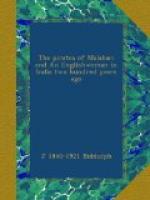On the 8th and 9th May he was brought up for trial at the Old Bailey. The first indictment against him was for the murder of Moore, the gunner of the Adventure. There had been a quarrel in which Moore accused Kidd of having ruined them all, on which Kidd called him a ‘lousy dog’; to which Moore replied in a rage, that if he was a dog it was Kidd who had made him one. At this Kidd hurled a bucket at him and fractured his skull. The jury found him guilty. He was then tried, together with nine of his crew, for the taking of the Quedah Merchant. His line of defence was that it was sailing under a French pass, and therefore a lawful prize, but he evaded actually saying so. He declared that Lord Bellamont had some French passes of ships he had taken, but would not produce them. That Kidd had captured some ships under French passes, and that the passes were in Bellamont’s hands, is extremely probable; but it is incredible that a French pass for the Quedah Merchant was in Bellamont’s hands, and that he held it back. He had been accused of complicity in Kidd’s piracies, and threatened with impeachment. Every consideration of private and political interest alike prompted him to clear himself of the charge, and confound those who accused the leading men of his party as well as himself.
Kidd tried to get the witnesses, some of them favourable to him, to say they had seen the French pass, but all they could say was that they had heard him declare there was one. The adverse witnesses deposed that he had feigned to believe that the French gunner of the Quedah Merchant was the captain, though they all knew he was not. When asked, “Captain Kidd, can you make it appear there was a French pass aboard the Quedah Merchant?” he replied, “My lord, these men say they heard several say so.” One of the Armenian owners was in court, but he did not examine him; nor could he say why he had not had the ship properly condemned, like the French ship taken between Plymouth and New York. His only reply was that he was not at the sharing of the goods, and knew nothing of it. For his attack on the Mocha fleet he offered no explanation.
He was found guilty, and was then tried for the captures of a Moorish ship (Parker’s), a Moorish ketch, and a Portuguese ship. Culliford and two others were next tried for taking a ship called the Great Mahomet. Three of Kidd’s crew were acquitted, the rest of the prisoners were found guilty, and sentenced to be hanged. Culliford was respited, having made his submission to Warren. Three of Kidd’s crew had hard measure dealt to them. They had made their submission under the King’s proclamation, but not to one of the commissioners appointed for the purpose, so their submission went for nothing. On the 12th May, Kidd, with six of his crew and two of Culliford’s, was hanged at Execution Dock, the common place of execution for pirates.




